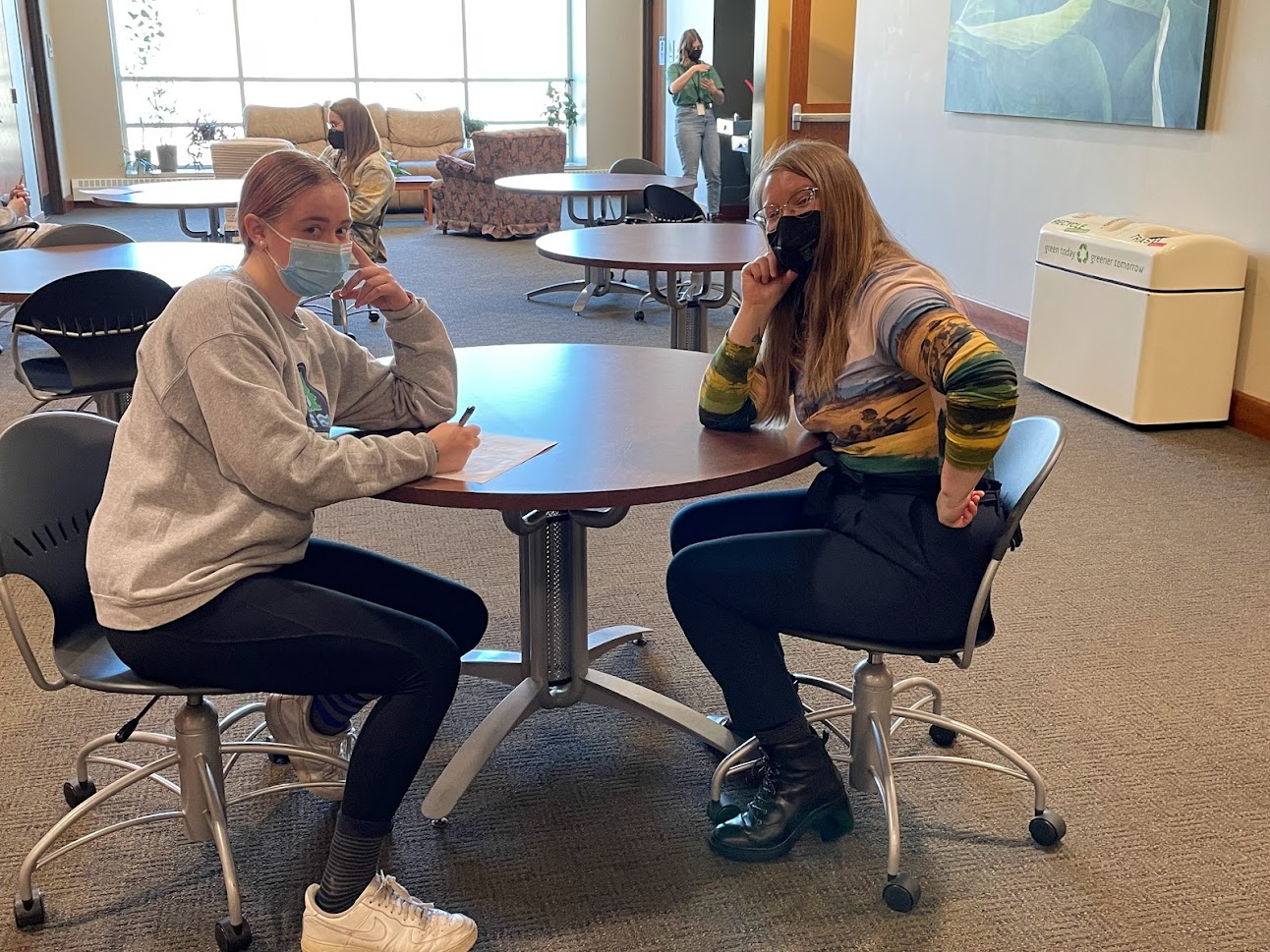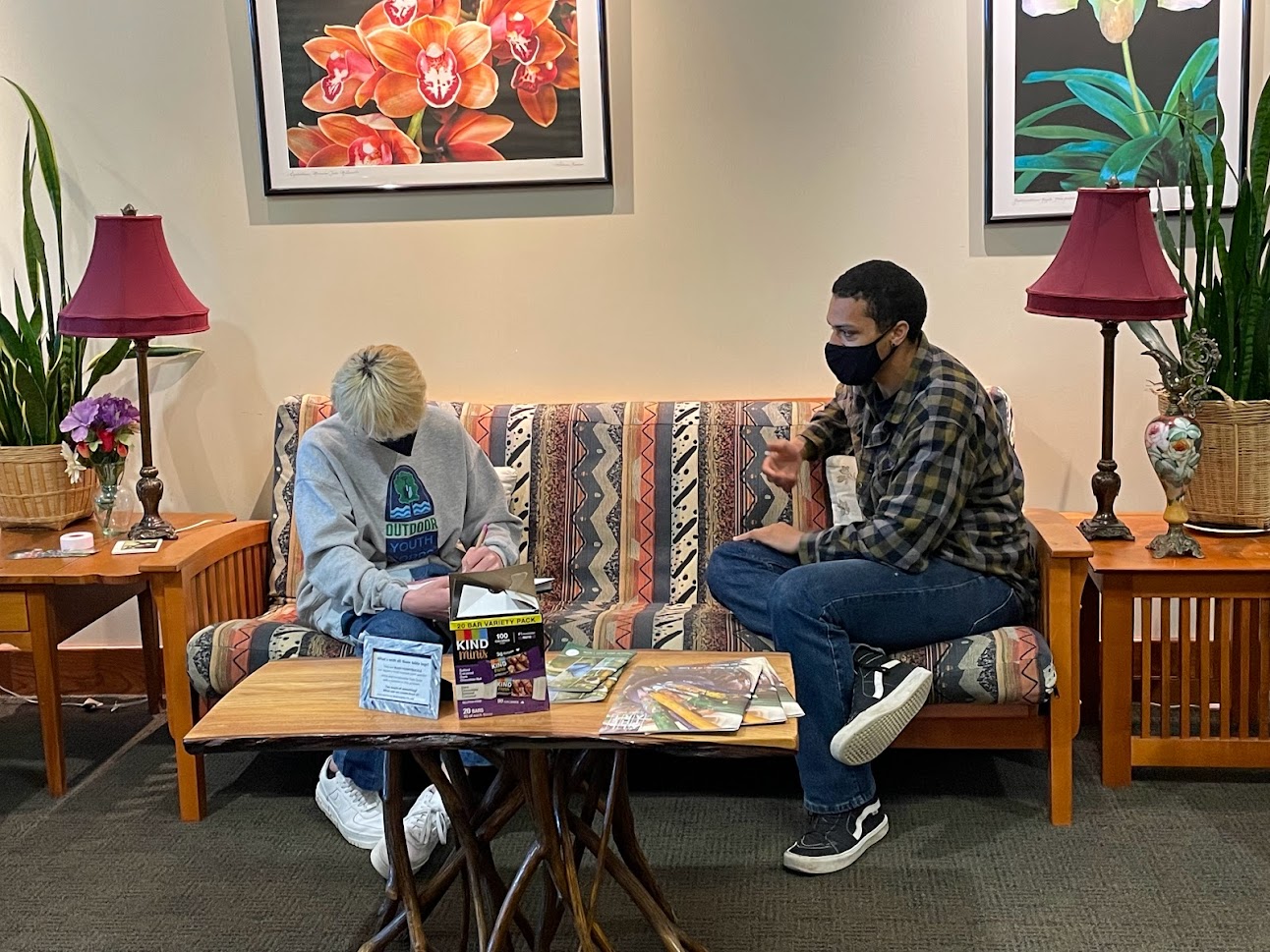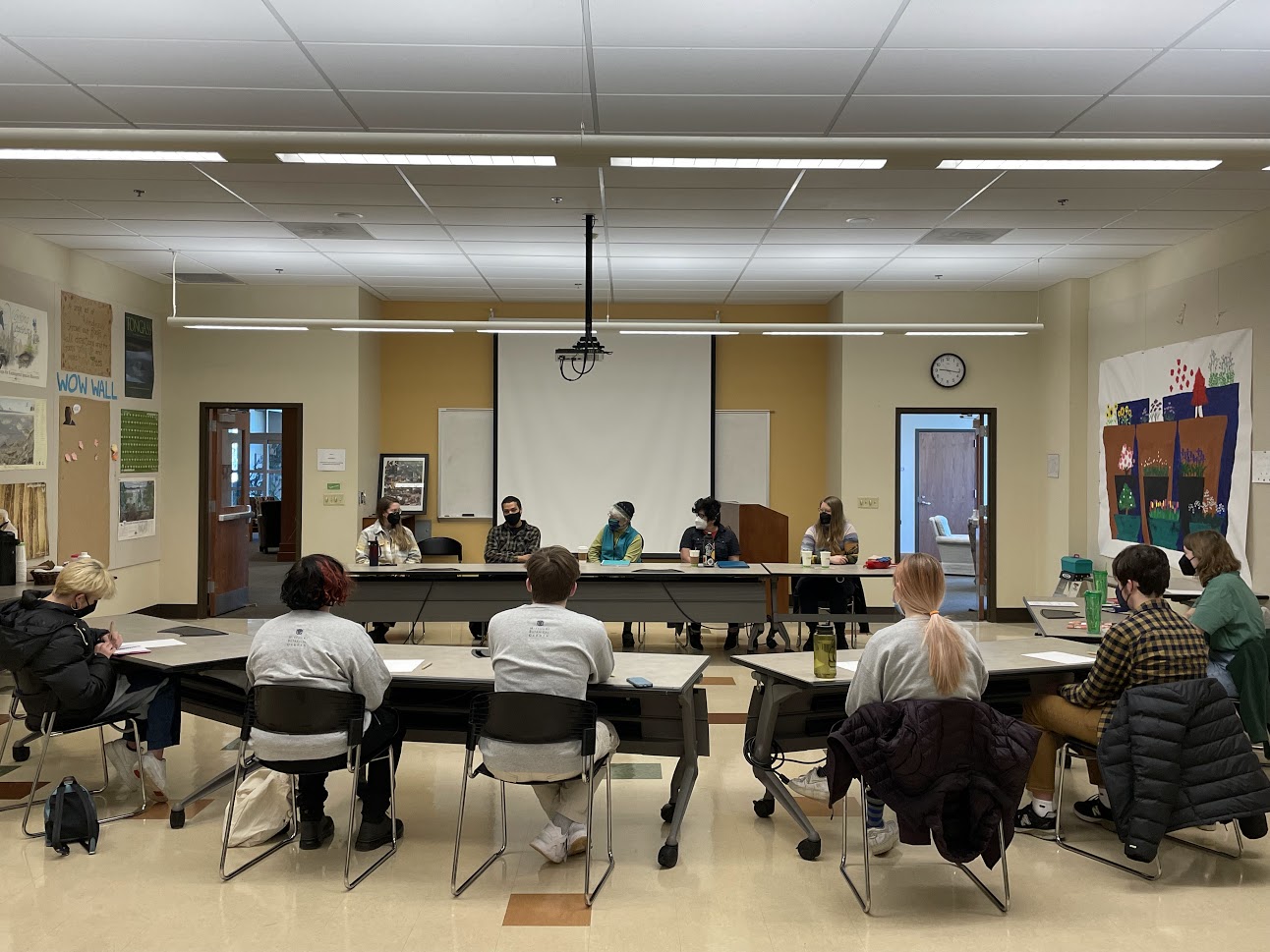The Outdoor Youth Corps (OYC) is an education and workforce development program that connects St. Louis area youth to environmental stewardship projects, community engagement opportunities, and environmental career pathways. The OYC program provides career mentorship to participants by introducing them to a wide variety of career paths, training opportunities, and paid work experience.
A large goal of the program is to provide professional development and networking opportunities for participants to connect with other environmental-based organizations and professionals throughout the region. To reach this goal, the OYC participated in a professional career panel. During the career panel OYC participants had the chance to ask five professionals meaningful questions and engage in valuable discussions relating to green resources, community empowerment, native ecosystems, and more.
The five professionals included:
- Adam Rembert, Restoration Ecology Coordinator, Litzsinger Road Ecology Center
- Allison Azmy, Horticulture Programs Coordinator, Litzsinger Road Ecology Center
- Karisa Gilman-Hernandez, Community Empowerment Organizer, Dutchtown South Community Corporation
- Abaki Beck, Freelance Researcher/Writer and Public Health Research Manager, Washington University
- Jean Ponzi, Program Manager, EarthWays Center of the Missouri Botanical Garden
OYC participants were able to conduct one-on-one interviews with the panelists in order to learn more about their careers and interests. Below are paraphrased notes from each of the interviews, written by OYC participants. Click here to learn more about OYC in general.
Adam Rembert, Restoration Ecology Coordinator for Litzsinger Road Ecology Center
What led you to this position/career?
A lifelong love for the outdoors piqued Adam’s interest in the biology and ecology fields, which led him to his career. Experiences with volunteer work and working in the garden were additional contributing factors.
How does the work you do directly affect the health of the St. Louis environment?
Adam works to restore nature, rebuild habitats, and bring back environmental relationships. In addition, he is working to restore various ecosystem services like carbon storage and regulating stormwater runoff, both of which are able to directly affect the health of the environment in St. Louis.
What is the best part about your job?
Adam said that there are many aspects of his job that he enjoys. What he enjoys the most, however, is the community involved. He is happy that he is able to give people a sense of stewardship and bring people together for a common cause. Adam also mentioned that he enjoys watching the progress of his work restoring ecosystems.
What is the most challenging part about your job?
Trying to obtain the resources to get the job done is probably the most challenging part of Adam’s job, whether this is getting the funding, materials, or even the people. Involvement of volunteering individuals in Adam’s job comes with the obligation of providing them the resources to get the job done, which can sometimes be difficult.
What has been your biggest accomplishment or favorite project you have worked on?
Projects involving rare plant conservation have been some of Adam’s favorites. This past year, Adam has been able to collect and plant the seeds of Missouri plants with conservation concerns. Seeing tangible proof that native plant communities are actually being restored is a big accomplishment. Adam believes that in his field, the work is never done, rather, it’s ongoing.
What do you wish people knew about your job/field?
Adam wishes that more people actually knew that his field exists. Many people assume that when you leave nature alone, it will simply restore itself. However, this is not true. Adam believes that it takes human interaction to both destroy and repair the environment, and his field focuses on reversing the damage that humans have done.
What advice do you have for people who are interested in pursuing a career like yours?
Spend as much time outside as you can, whether it’s a run in your neighborhood or a hike on a local trail. Be curious about your environment and get involved in any way possible, like volunteering in a community project. Studying biology or ecology can also open a wide variety of opportunities.
Karisa Gilman-Hernandez, Community Empowerment Organizer for Dutchtown South Community Corporation
What is your name and current position?
Karisa Gilman-Hernandez, Community empowerment organizer. This position entails community work, help housing work, removal of solid waste, and clean-ups.
What led you to this position/career?
Karisa is from intercity St. Antonio, Texas. The racial discrepancies she witnessed while growing up there had a massive impact on her life and why she chose to go into this career path. Another factor that led Karisa to her career is watching her grandfather help bring Habitat for Humanity to the US with the first US Affiliate being Habitat for Humanity San Antonio. She got her position as a community organizer by chance. Karisa saw that Dutchtown South was looking to hire community organizers; she applied and got the job.
How does the work you do directly affect the health of the St.Louis environment?
The environment impacts both physical and mental health. Karisa works to clean up and approve the environment and as a result, this helps to improve people’s physical and mental health. Karisa usually focuses on smaller, more direct projects, like cleaning alleyways. But, she also works with politicians to change policies and bring attention to environmental and health concerns. Karisa played a large role in getting lead out of schools, which is going to be a long and involved process. Karisa has brought up the issues with lead in schools to the EPA Administrator, Michael Regan who said he had not heard from his staff about lead in schools even though they have been doing research around lead in the US. A few months later President Biden made a point to tackle lead in schools in a statement. While Karisa is sure there was more research and others who raised this issue, Karisa was at least one of those voices.
What is the best part about your job?
When I asked Karisa this, she gave me two responses. The first pertained to how proud of herself she was for what happened with the issue of getting lead out of schools, and the more raw response was giving people tools, words, and a space for them to come up with solutions to issues.
What is the most challenging part about your job?
When I asked Karisa this, she told me that the most difficult part of her job was getting people involved and passionate about what she does.
What has been your biggest accomplishment or favorite project you have worked on?
According to Karisa, her biggest accomplishment is getting on people’s radars, and her Environmental Racism Series.
What do you wish people knew about your job/field?
Karisa wished that people knew her job exists.
What advice do you have for people who are interested in pursuing a career like you?
If you are interested in pursuing her career path, she suggests volunteering at similar organizations, or for organizations that advocate or do things you are passionate about. Go to events and network. The last thing she suggested was to go to protests.
Allison Azmy, Horticulture Programs Coordinator, Litzsinger Road Ecology Center
What led you to this position/career?
After getting a business degree, Allison found positions with corporations. Eventually this became unfulfilling and Allison decided to use her love for the outside and plants to pursue a career in horticulture.
How does the work you do directly affect the health of the St.Louis environment?
Allison provides educational experiences for visitors at Litzsinger, and she believes that teaching people about plants is the best way to affect the health of St.Louis.
What is the best part about your job?
“Propagating plants, growing plants, and being a part of the educational communities.”
What is the most challenging part about your job?
Even though the best part of Allison’s job is working with plants, she also finds propagating plants to be challenging but rewarding.
What has been your biggest accomplishment or favorite project you have worked on?
Allison mentioned starting at Litzsinger at the end of the spring gave her a shorter time frame for growing plants, but she was able to accomplish several landscaping projects at the site last year. She said that working with and maintaining native plants has been very rewarding.
What do you wish people knew about your job/field?
Allison believes that getting education about ecology and our natural world is very important. And coming to places like Litzsinger can be very beneficial.
What advice do you have for people who are interested in pursuing a career like yours?
Have your own experiences and learn things for yourself.
Abaki Beck, Freelance Researcher/Writer and Public Health Research Manager at Washington University
What led you to this position/career?
Abaki grew up with her mother’s family on the Blackfeet reservation, collecting plants for medicine and learning the values of her community that have led to her focusing on environmental justice. The writing part of her career is inspired by her love of storytelling. Her writing is focused on environmental/native/racial justice and cultural revitalization. She worked with congress member Betty McCollum on health and Native American policy for about 1 year, but she was more interested in field work.
How does the work you do directly affect the health of the St. Louis environment?
More on a national level, but her work is focused on highlighting tribal community’s solutions for climate change/climate issues. “My goal in my writing and my research is to elevate and celebrate the brilliance of Indigenous knowledge to create community based goals to combat climate change.”
What is the best part about your job?
“I love writing, I am very happy to be able to make a career writing—especially about things I care about.” The best part is being able to meet great people that help to create an optimistic attitude about the state of the future rather than wallowing about the negative.
What is the most challenging part about your job?
Needing to have another full time job to support herself (health insurance, etc.) Lots of journalism is based on underpaid workers, however, doing freelance writing allows her to write exclusively about what she is passionate about. Saint Louis has a really small native community.
What has been your biggest accomplishment or favorite project you have worked on?
Blackfeet food sovereignty oral history project where she interviewed knowledgeable community members about how their food resources have been transformed since the elder’s childhoods. It was the first ever report on Blackfeet food sovereignty, and inspired people to care about Blackfeet food sovereignty and since then there have been other reports and it also helps with knowledge preservation.
What do you wish people knew about your job/field?
You’ll get a lot of rejections freelance writing. It’s important to make sure that the values of the media outlets you use align with your personal values; there will be a lot of outlets that do not align at all. It takes time to build relationships with the editors.
What advice do you have for people who are interested in pursuing a similar career like yours?
Stand by how you want to tell a story. There are lots of outlets that are white/male/west-centric and you don’t HAVE to use them just because they’re mainstream. The first year you will likely get a lot of rejections and it will take a lot of work but eventually you will build up your relationships with editors and others and it will become easier. It’s so important to read a lot! It helps with knowing styles of writing and what is important to you, and to your community. The more you read and write the better you’ll get at it.
How could the native community in Saint Louis be uplifted/have greater visibility?
There is a smaller native community in Saint Louis but a huge and rich native history, it’s important to focus on contemporary history along with more ancient history, and engage with surrounding tribes in other states. Focus on native community rather than non-native education.
Jean Ponzi, Green Resources Manager for the Missouri Botanical Garden’s EarthWays Center.
What led you to this position/career?
"It was a total accident. It was completely about relationships." When she moved here, she loved visiting the Garden. She took a part-time job for Eco-Act in the '80s, and then took her current job in the '90s. Since 1988, she has hosted an environmental interview show (originally live radio, now podcast) called Earthworms.
You have worked at the Botanical Garden for almost thirty years. What has kept you engaged in the same line of work for so long?
She was a feminist in her twenties, and it was important to her to work with women. Early on, the EarthWays team was all women, and over the years are still a lot of strong women. She loves nature, and always enjoyed the beauty of the Garden. When she moved here in the 1970s and before she even started working at the Botanical Garden, she was a member and would stroll the Garden almost every day. She doesn't like to travel and is happy staying in one place. As the world is rapidly changing, she continues to strive to be of service in any way she can with the skills she has. One example of this is her Earthworms podcast: she has adapted to modern technology and records new episodes in her closet where the acoustics are good. She continues to focus her skills in communication and public speaking to contribute to the mission of the Garden.
How does the work you do directly affect the health of the St. Louis environment?
"It's a big sphere of influence." "I can talk. Not everyone likes to talk in front of people, or a microphone." The Garden has a global reputation, and Ponzi largely attributes this to its former President, Peter Raven. He was the president when she started working at the Garden, and one of his major accomplishments that she points out was creating the Garden's sustainability division, by bringing in the EarthWays team. She strongly believes the Garden is a beautiful place for people to escape the stress of daily life, and connect to nature. She mentioned that, after the 9/11 attacks, many people came to the Garden just to walk in silence and delight in the tranquility of nature. "That's my motto. Whatever it takes." Ponzi continues to do whatever it takes to make ecological understanding accessible to everyone and keep people interested in the Garden.
What is the most challenging part about your job? What do you wish the Garden would change/improve upon?
She sees that the driving ethos of most industries today is "Do More." She believes this is contrary to sustainability because sustainability is about the cycles of More and Less. We talked a lot about this idea of doing less in terms of driving cars. Driving is such an integral part of modern life, but it is harmful to a sustainable future. Jean believes that driving for pleasure is helpful to people's mental health, but relying on driving for one's daily commute is something that we should work away from. Jean also mentioned how the Botanical Garden does not yet have a policy on Climate Change. "I'm like, 'Hello! It's about time!’” The Zoo, by contrast, has one of the strongest and best-regarded climate policies in the region. She believes that this is a change that is coming soon for the Garden as Climate Change becomes more and more of a threat to modern life.
What has been your biggest accomplishment?
She first mentioned persistence. She believes that "when things accumulate over time, there is value in that." She mentioned how the programs she has worked on, like the St. Louis Green Business Challenge, have grown in maturity during her time at the Garden and are ready for whoever takes them over when she passes them on. (She has worked on the Green Businesses Initiative since its infancy, for 13 years.) She also mentioned, once again, that relationships have been a driving force throughout her career.
Finally, what can young people like me do right now in our communities and/or schools to help the cause of sustainability?
Firstly, we can actually learn how ecology works. Today, people focus more on the visible effects of sustainability. While it is important to read the headlines about the state of climate change, it is not emotionally stable for us to constantly be reminded of such a horrific problem. What is better is learning about (and FROM) ecosystems so we can contribute to change, truly sustainably. What Jean likes most about the issue of sustainability is how it is "intergenerational," as she says. Just the fact that the two of us could have this conversation is evidence of that. She believes that will be its lifeline going forward, and interactions between generations are a key to combating climate change and keeping nature a part of society.


